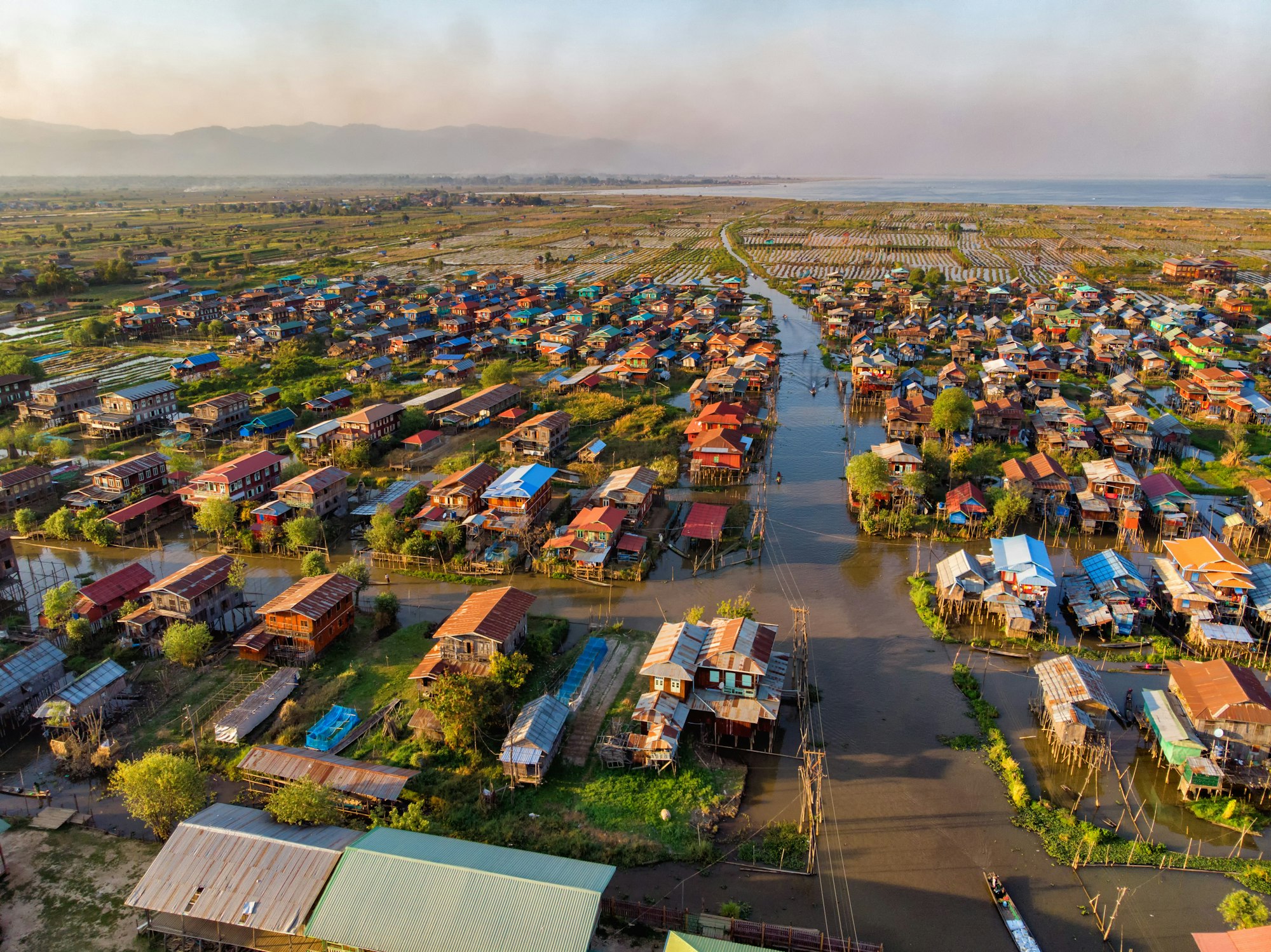Myanmar's Massive Scam Hub Crackdown: Nearly 1,600 Arrests in Five Days

November 23, 2025 - In one of the most significant enforcement actions against Southeast Asia's sprawling cybercrime industry, Myanmar's military forces arrested nearly 1,600 foreign nationals during a five-day operation targeting the notorious Shwe Kokko scam compound along the Thai border. The raids, conducted between November 18-22, 2025, resulted in the seizure of massive quantities of equipment used to perpetrate online fraud schemes that have bilked victims worldwide out of tens of billions of dollars.
The Scale of the Operation
According to Myanmar's state media, The Global New Light of Myanmar, authorities seized:
- 2,893 computers
- 21,750 mobile phones
- 101 Starlink satellite receivers
- 21 routers
- Large quantities of industrial materials used in online fraud operations
On Saturday, November 22 alone, 223 individuals were detained, including 100 Chinese nationals. Dramatic video footage published by local media showed a steamroller crushing hundreds of computer monitors lined up in rows next to piles of already destroyed mobile phones at the compound.

The Shwe Kokko Criminal Empire
Shwe Kokko represents one of Myanmar's most notorious scam operations. The compound, valued at $15 billion with a planned area of 120 square kilometers, has evolved into a full-scale "fraud factory" disguised as a modern business park. Despite its legitimate-looking exterior featuring hotels, restaurants, and manicured lawns, the complex serves as the operational hub for sophisticated online scams targeting victims globally.
The compound is linked to Chinese-Cambodian businessman She Zhijiang, who was recently extradited from Thailand to China to face charges related to online gambling and fraud. The United States has sanctioned She and his Yatai firm, describing Shwe Kokko as "a resort city custom-built for gambling, drug trafficking, prostitution, and scams targeting people around the world."
Part of a Broader Crackdown
The Shwe Kokko raids represent the second major operation in Myanmar's highly publicized crackdown on scam centers. In October 2025, Myanmar forces targeted KK Park, another massive scam compound near Myawaddy, demolishing over 600 buildings and detaining thousands of individuals. The junta claims it has destroyed "100 percent" of KK Park's buildings to prevent operations from re-establishing.
Between these operations, Myanmar's military has reportedly arrested over 9,500 foreign nationals from scam compounds since January 2025, though experts warn this represents only a fraction of those trapped in these facilities.
The China Factor
The timing and intensity of Myanmar's crackdown appears directly linked to pressure from China, a key military backer of Myanmar's junta. Chinese nationals make up a significant portion of both the scam operators and their victims, creating diplomatic tensions between Beijing and Yangon.
In mid-November 2025, Myanmar's Immigration Minister visited China's Shandong and Beijing provinces to discuss joint crackdowns on scam centers, border stability, and information sharing to prevent illegal border crossings. Jason Tower, a senior expert at the Global Initiative Against Transnational Organized Crime, noted that the announcement of a new U.S. Strike Force focused on these operations was also a key factor influencing Myanmar's decision to take action.
However, Myanmar's junta spokesman has pushed back against U.S. involvement, suggesting Washington may have "a deeper hidden agenda" beyond simply combating online fraud.
The Starlink Connection
A significant development in the story emerged when investigations revealed that scam operations had been using Starlink satellite internet terminals to maintain operations even during power cuts and internet shutdowns. After an AFP investigation found Starlink receivers installed "at a huge scale" on scam compound rooftops—with as many as 80 dishes visible on a single building in KK Park—SpaceX took action.
In October 2025, SpaceX announced it had "proactively identified and disabled over 2,500 Starlink Kits in the vicinity of suspected 'scam centers'" in Myanmar. Lauren Dreyer, SpaceX's vice president of business operations, stated the company works to identify violations and cooperates with law enforcement agencies worldwide.
Starlink devices became crucial for scam operations after Thailand implemented power and internet blockades earlier in 2025 to disrupt the compounds. The satellite service's independence from national infrastructure made it ideal for criminal operators, though SpaceX notes it is not licensed to operate in Myanmar.
U.S. Senator Maggie Hassan has demanded answers from Elon Musk about SpaceX's monitoring systems, warning that "transnational criminals halfway across the world may be perpetrating scams using Starlink internet access."
The Human Trafficking Crisis
Behind the technical infrastructure lies a devastating human trafficking crisis. Estimates suggest between 100,000 to 200,000 people are currently held in forced labor situations within Myanmar's scam compounds, with the Australian Strategic Policy Institute documenting explosive growth from 11 to 30 dedicated compounds along the Thai-Myanmar border since 2021—expanding at approximately 13.5 acres per month.
Victims are typically lured with false promises of high-paying white-collar jobs, often advertised as IT, sales, or customer service positions in Bangkok or other regional hubs. Once they arrive, their passports are confiscated, and they're trafficked across borders into Myanmar's militia-controlled regions.
Survivor testimonies paint a horrific picture of conditions inside these compounds:
- Routine torture including electric shocks and beatings
- Impossible daily quotas (sometimes $10,000 in scam profits per day)
- Threats of organ harvesting for non-compliance
- 12-16 hour workdays sending thousands of messages to potential victims
- Constant surveillance in heavily guarded facilities
In February 2025, 260 trafficking victims from 19 countries were released and handed to Thai authorities. One woman named Seye recounted being shocked with electric probes almost daily for nine months. Thai officials identified 258 of these individuals as human trafficking victims.
The Scam Techniques
Workers in these compounds are forced to execute various sophisticated fraud schemes:
Pig Butchering Scams: Named for "fattening up prey before the slaughter," scammers build fake romantic or investment relationships over weeks or months, ultimately stealing victims' life savings through fraudulent cryptocurrency investments. These pig butchering scams generated an estimated $12.4 billion in 2024 alone, making them one of the world's most profitable criminal enterprises.
Romance Scams: Exploiting personal connections to manipulate victims emotionally before requesting money transfers.
Investment Fraud: Using AI-generated content and professional-looking websites to promote fake cryptocurrency platforms, forex trading, or other investment opportunities.
Workers operate across multiple languages using AI-powered tools. Scripts, dialogue, and messaging are generated with AI assistance, with different teams handling various aspects of the scam pipeline. Learn more about the most dangerous scams of 2025 and how criminals are leveraging AI technology to make their operations more sophisticated.
Economic Impact
The financial toll of these operations is staggering. According to a 2024 United States Institute of Peace report, criminal organizations in Cambodia, Laos, and Myanmar generate approximately $43.8 billion annually through illicit activities, including online scams. A 2023 UN report estimated that scam victims in Southeast and East Asia alone lost up to $37 billion, with global losses likely "much larger."
Chinese nationals represent a significant portion of both scam operators and victims. In fact, China faces its own domestic fraud epidemic, with nearly 28% of surveyed citizens suffering financial losses from scams, even as Chinese criminal organizations operate massive fraud compounds targeting victims globally.
The United States Institute of Peace reports that pro-junta armed groups pay Myanmar's military approximately 50 percent of the $192 million earned annually from the Shwe Kokko Project alone, demonstrating how deeply intertwined these criminal operations are with the political and military establishment. With cryptocurrency scams generating billions through breaches and fraud schemes, the intersection of traditional crime and digital currencies creates new challenges for law enforcement.
Skepticism About the Crackdowns
While Myanmar's junta has made these operations highly publicized, significant skepticism remains about their effectiveness and motivations. Several factors fuel doubts:
Continuing Operations: Anti-human-trafficking sources report that despite the KK Park raid, many victims remain trapped and are still being forced to conduct scams from other buildings within the compounds.
Selective Targeting: Some monitors suggest the raids are choreographed to relieve pressure from Beijing without significantly impacting profits that enrich the junta's militia allies.
Infrastructure Intact: Despite dramatic videos of equipment destruction, investigations reveal that many compounds quickly adapted. Scammers acquired large generators to maintain power after Thailand's electricity cutoffs, and businesses continue operating with only slight disruptions.
New Compound Growth: Satellite imagery from October 2025 revealed new building construction in Shwe Kokko and KK Park even after the supposed crackdowns, with multiple blocks of buildings and infrastructure appearing.
Militia Complicity: The Democratic Karen Buddhist Army (DKBA) and Karen Border Guard Force (BGF), both junta allies, control many scam compounds. While they've claimed credit for crackdown participation, both groups are widely believed to have previously provided protection to scam operators.
Border Impact
The crackdowns have created significant cross-border tensions. During demolition operations at KK Park, continuous explosions caused debris to fly across the Moei River into Thailand, damaging Thai homes. One Thai resident's home has been damaged 52 times from the demolitions. The explosions have also caused severe psychological distress among Thai border communities.
Additionally, large numbers of foreign nationals have attempted to flee across the border into Thailand to escape the crackdowns. Thai border security forces have intercepted numerous illegal crossings and continue tightening patrols.
The Broader Regional Picture
Myanmar is just one part of a larger Southeast Asian scam ecosystem. Cambodia and Laos host hundreds of similar operations. The compounds flourish in areas where governance is weak, corruption is rampant, and military or militia groups control territory with minimal oversight.
Thailand plays a complex role as both a transit point for trafficking victims and a nation taking action against the compounds. In early 2025, Thailand cut electricity, fuel, and internet supplies to border towns hosting scam operations, though this primarily pushed operators to adopt alternative infrastructure like Starlink.
International Response
Global pressure on these operations is increasing:
United States: In November 2025, the U.S. announced a new "Scam Center Strike Force" to target cybercriminals in Southeast Asia. The U.S. has also sanctioned numerous individuals and entities connected to scam operations, including four senior DKBA commanders and BGF leader Colonel Saw Chit Thu and his two sons. This represents part of a broader international effort to combat cybercrime, including the takedown of major criminal marketplaces.
China: Beijing has increased pressure on Myanmar to address scam centers that victimize Chinese citizens. China has received thousands of repatriated scam workers, with over 43,000 handed over by March 2024.
Regional Cooperation: South Korea and Cambodia agreed to establish a dedicated task force to pursue traffickers. Multiple nations are working with embassies and government agencies to facilitate rescue, repatriation, and care of survivors.
Challenges in Combating the Industry
Several factors make these operations particularly difficult to eliminate:
Political Economics: Myanmar's military junta increasingly relies on revenue from scam operations amid international sanctions and declining aid. This creates perverse incentives against genuine enforcement.
Territorial Control: Many compounds operate in border regions controlled by ethnic militias with complex relationships to the central government.
Rapid Adaptation: When one compound is shut down, operations quickly relocate or rebuild. The criminal networks demonstrate remarkable resilience and adaptability.
Victim Complexity: Many rescued individuals face additional challenges. Some have been charged with crimes in their home countries, despite being trafficking victims. Repatriation delays cause severe physical and psychological suffering.
Technology Arms Race: Criminal groups rapidly adopt new technologies, including AI for scam scripts, cryptocurrency for money laundering, and satellite internet to bypass traditional infrastructure.
What This Means for Potential Victims
The existence of these massive fraud operations should serve as a stark warning:
Job Offers: Be extremely skeptical of unsolicited job offers, especially those promising high salaries for white-collar work in Southeast Asia. Legitimate employers don't recruit through random social media messages or require you to travel to receive an offer.
Investment Opportunities: Any investment opportunity that comes through social media, dating apps, or unsolicited messages is likely fraudulent. Legitimate investments don't require you to use unknown platforms or apps.
Romance Scams: Be cautious of online relationships that quickly turn to discussions of money, investments, or cryptocurrency. Scammers build trust over weeks or months before making their move. Understanding common romance scam tactics can help you recognize warning signs before it's too late.
Verification: Always independently verify companies, investment platforms, and job opportunities through official channels, not links provided by the person contacting you.
The Path Forward
Effectively combating this industry requires comprehensive, sustained international cooperation:
Victim Support: Long-term funding for survivor support, including psychological care, legal assistance, and safe repatriation programs.
Law Enforcement Training: Providing cyber forensic training, real-time fraud monitoring tools, and AI-powered detection systems to frontline agencies.
Financial Pressure: Targeting the money flows that fund these operations, including sanctioning enablers and shutting down cryptocurrency channels used for money laundering.
Technology Accountability: Ensuring technology companies like SpaceX, telecommunications providers, and financial services can't be exploited to enable these operations.
Addressing Root Causes: Tackling the weak governance, corruption, and political instability that allow these compounds to flourish.
Public Awareness: Educating potential victims about recruitment tactics and scam techniques to reduce the success rate of these operations. Familiarize yourself with common scam types to better protect yourself and others.
Conclusion
Myanmar's recent crackdowns on Shwe Kokko and other scam compounds represent significant enforcement actions, but they're unlikely to eliminate an industry that generates tens of billions of dollars annually. The fundamental problems—weak governance, military complicity, sophisticated criminal networks, and massive profit margins—remain largely unchanged.
For those targeted by these scams, the most effective defense remains awareness and skepticism. Understanding that behind every "hello" text or investment opportunity could be a trafficked worker forced to defraud you should motivate extreme caution in online interactions with strangers.
The Myanmar scam compound story illustrates how modern cybercrime has evolved into an industrial-scale operation backed by political and military interests, powered by cutting-edge technology, and sustained by human trafficking. Until the international community addresses all these dimensions comprehensively, the cycle of raids, relocations, and resumed operations will likely continue.
As of November 2025, despite the arrests and equipment seizures, experts estimate that 100,000 or more people remain trapped in forced labor situations across Myanmar's scam compounds, working day and night to perpetrate frauds that victimize people worldwide. The November raids may have disrupted some operations, but the underlying system remains largely intact.
For more information on protecting yourself from online scams, recognizing human trafficking indicators, and reporting suspicious activity, visit the FBI's Internet Crime Complaint Center (IC3) or contact your local law enforcement. Stay informed about the latest scam trends and explore our comprehensive scam protection resources.






